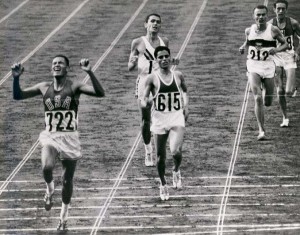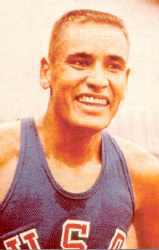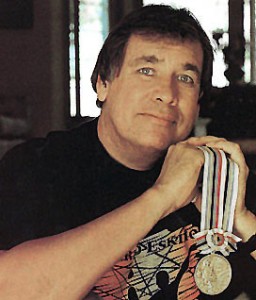Billy Mills: A Giant Killer and Trail Blazer

Billy Mills is the only American to win a gold medal in the 10,000 meter run.
“You have to look deeper, way below the anger, the hurt, the hate, the jealousy, the self-pity; way down deeper, where the dreams lie, son. Find your dream. It’s the pursuit of the dream that heals you.”
These are the words of a Lakota (Sioux) father to his young son struggling with the whys of poverty, adversity, and racism in 1940s America.
When the young Oglala Lakota brave was 12 years old his father died, leaving him an orphan. Wisely, he took his father’s advice and pursued sports in his quest to find that dream.
Football and boxing filled the void for a time, but the young lad discovered a special connection to his inner dream when he took up distance running.
“All I had was the pursuit of a dream: I wanted to be an Olympian,” the boy would later say.
He was a natural. He found success in high school, setting numerous school records. Bill Easton, the track coach at the University of Kansas, was impressed with the gangly youngster and offered him a track scholarship.
Opportunity knocked…and Billy Mills opened the door.
Though Mills flourished academically and on the track, all was not well on the social front. The predominantly white Kansas campus was a far cry from his Pine Ridge reservation, and he often felt isolated and uprooted.
But the words of his father and his Native American pride spurred him on, past these challenges and into uncharted personal accomplishments. He won the 1960 cross country national championship and was a member of two national champion track and field teams.
He earned a B.S. degree in Physical Education.
After graduation, Mills was commissioned as a lieutenant in the Marine Corps and continued the pursuit of his Olympic dream. He trained vigorously for 18 months and qualified for the 1964 US Olympic Track and Field team in the 10,000 meters and in the marathon.
Although Mills’ accomplishments on the track to this point were impressive on U.S. soil, American distance runners in the early 1960s were not considered elite on the world stage. Indeed, the favorite in the 1964 Tokyo Olympics 10,000 meter final was Australian Ron Clarke, who had set 17 world records. Clarke’s qualifying time was nearly a minute faster than Mills’.
The media touted the expected duel between Clarke and Tunisia’s Mohammad Gammoudi. The Tunisian was the forerunner of the great African athletes who would later dominate world distance running. Billy Mills was considered a long shot “also-ran”.
But when the race had neared its final lap, the leaders were Clarke, Gammoudi…and Mills. The three had separated themselves from the pack in their torrid pace, even lapping other runners going into the bell lap.
The pace quickened, the crowd noise elevated, and television viewers around the world got out of their chairs as the bell rang out. The 10,000-meter enduro had become a 400-meter sprint.
And many wondered, even in America, “Who is this crew-cut Indian kid?”

Prior to his Olympic moment, Billy Mills wasn't even well known in the United States.
Billy Mills entered the first turn with a slight lead on Clarke. Gammoudi was a stride back. It looked like a footrace between Clarke and Mills coming out of turn two – until Clarke took gamesmanship to its extreme. He forcefully “nudged” Mills, causing him to stumble. The American regained his stride but lost his lead position.
In the back straight, the diminutive Gammoudi gambled and started his final kick. He flagrantly forced his way between the sturdier Clarke and Mills, shoving them both out of the way. By disrupting their rhythm and pace, the Tunisian gave himself a five-meter lead going into the far turn.
Clarke recovered quickly and stayed close to Gammoudi as Mills got caught in traffic entering the final turn.
It appeared that all was right with the world again as the Aussie and the African battled entering the final straight, while the long shot faded from view.
But Mills suddenly bolted out of his prison and found a reserve of strength and fortitude.
Like a rock released from a slingshot, he came out of the turn.
His huge stride seemed to eat up the track as he preyed first on Clarke, then on Gammoudi.
The stadium erupted.
At this point, the contest was no longer about tactics, nationality, or even gold. It was about courage, will, and a young boy’s dream.
Gammoudi was digging deep, abandoning form, struggling to hold on. Although he was actually moving fast, he appeared to be slogging in quicksand as Mills blew by him at full gallop.
The Sioux warrior with the Marine haircut won by two meters going away.
Mills’ time of 28:24.4 was an Olympic record and an incredible 50 seconds faster than his previous best.
Ron Clarke and Mohammad Gammoudi were considered the kings of their sport in 1964, and Billy Mills’ victory is still lauded as one of the greatest upsets in Olympic history. However, the real giant who came tumbling down in that race of races was the regrettable set of circumstances which young Billy Mills was born into.
Through deep conviction and an overcoming will, Mills was able to rise above the oppressive forces of poverty and racism to fulfill his dream. He became a hero and a champion of Native American causes.

Billy Mills is now a motivational speaker and is always happy to show off his gold medal.
His Lakota tribe honored him as a warrior and gave him the name Makata Taka Hela, which means “loves his land.”
In a Native American custom called the “giveaway,” Mills has used his notoriety and popularity to give back to his people the pride and respect he purchased in his own pursuit of a healing dream.
Today, Billy Mills is active as a motivational speaker and heads several programs designed to empower Native American youth to achieve their goals.
Watch video
who is are his parents?